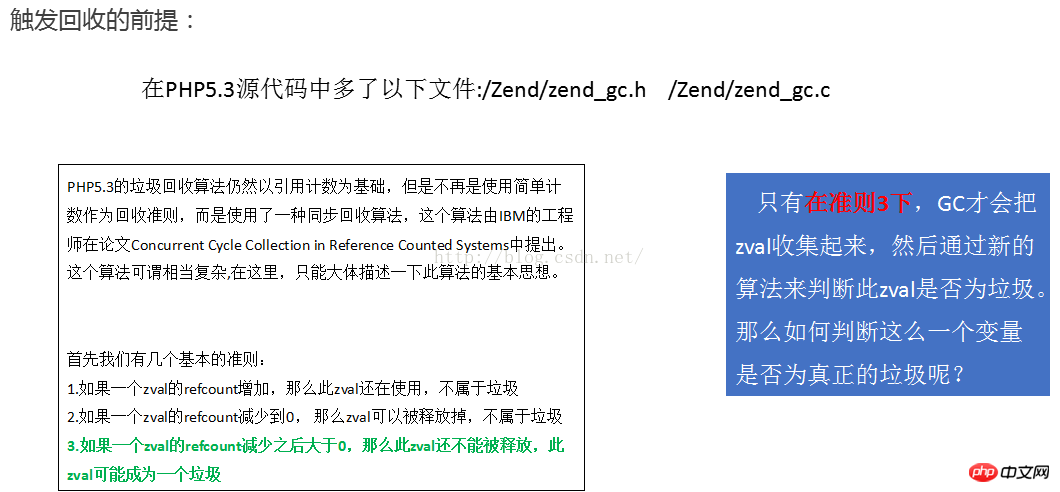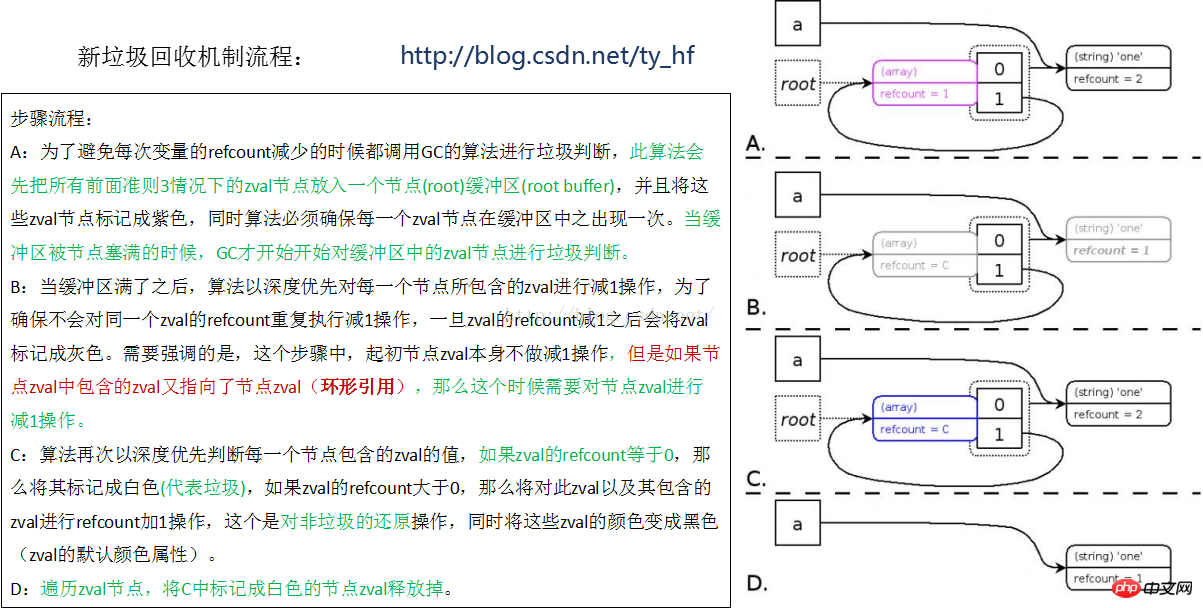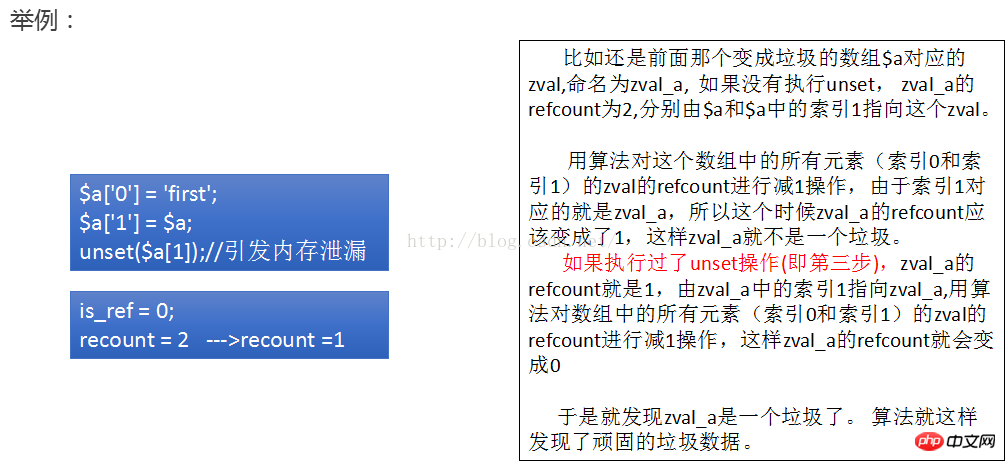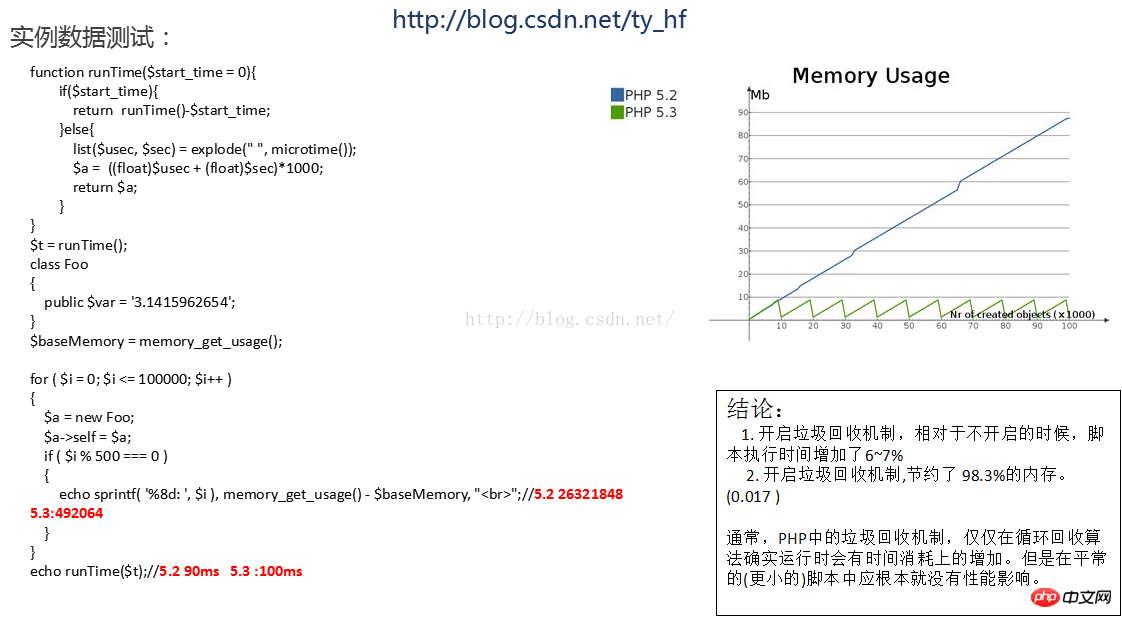 Backend Development
Backend Development
 PHP Tutorial
PHP Tutorial
 PHP kernel - graphic introduction to memory leaks and new garbage collection mechanism
PHP kernel - graphic introduction to memory leaks and new garbage collection mechanism
PHP kernel - graphic introduction to memory leaks and new garbage collection mechanism
The garbage collection mechanism is a dynamic storage allocation scheme. It automatically releases allocated memory blocks that are no longer needed by the program. The process of automatically reclaiming memory is called garbage collection. The garbage collection mechanism allows programmers not to worry too much about program memory allocation, so that they can devote more energy to business logic.
PHP also implements dynamic management of memory at the language layer. This has been explained in detail in the previous chapters. Dynamic management of memory frees developers from cumbersome memory management. Come to the rescue. In conjunction with this, PHP also provides a garbage collection mechanism at the language layer, so that programmers do not have to worry too much about program memory allocation.
Before PHP5.3, PHP only had simple garbage collection based on reference counting, when a variable is referenced When the count becomes 0, PHP will destroy this variable in memory, but the garbage here cannot be called garbage. And PHP will release the content occupied by this process/thread after the end of a life cycle. This method determines that PHP does not need to consider too much memory leakage in the early stage. However, with the development of PHP, the number of PHP developers has increased and the business scope it carries has expanded.
A more complete garbage collection mechanism was introduced in PHP5.3. The new garbage collection mechanism solves the problem of reference memory leaks that cannot handle cycles. Next, we will discuss the new garbage collection mechanism with example test data.

For example, $a =$b=1, then they point to a zval with a value of 1 and refount=2, which means there are two variables pointing to it. For details, see PHP kernel storage mechanism (separation/change ))


The following is the actual data A test, the conclusion is in the lower right corner:

##How to avoid memory leaks:
1. Write High-quality code to reduce the possibility of memory leaks2. Recycle according to the PHP life cycle and let the system automatically recycle memory (effective for non-resident programs, RINIT, RSHOTDOWN)
3. Manual recycling, that is, restart the server nginx or apache (MINIT,MSHOTDOWN)
4. Increase the php.ini configuration file: php.ini memory_limit = 128M (not recommended)
##Fatal error: Allowed memory size of 134217728 bytes exhausted (tried to allocate 38218371 bytes) 128MB = 134217728byte
The above is the detailed content of PHP kernel - graphic introduction to memory leaks and new garbage collection mechanism. For more information, please follow other related articles on the PHP Chinese website!

Hot AI Tools

Undresser.AI Undress
AI-powered app for creating realistic nude photos

AI Clothes Remover
Online AI tool for removing clothes from photos.

Undress AI Tool
Undress images for free

Clothoff.io
AI clothes remover

AI Hentai Generator
Generate AI Hentai for free.

Hot Article

Hot Tools

Notepad++7.3.1
Easy-to-use and free code editor

SublimeText3 Chinese version
Chinese version, very easy to use

Zend Studio 13.0.1
Powerful PHP integrated development environment

Dreamweaver CS6
Visual web development tools

SublimeText3 Mac version
God-level code editing software (SublimeText3)

Hot Topics
 CakePHP Project Configuration
Sep 10, 2024 pm 05:25 PM
CakePHP Project Configuration
Sep 10, 2024 pm 05:25 PM
In this chapter, we will understand the Environment Variables, General Configuration, Database Configuration and Email Configuration in CakePHP.
 PHP 8.4 Installation and Upgrade guide for Ubuntu and Debian
Dec 24, 2024 pm 04:42 PM
PHP 8.4 Installation and Upgrade guide for Ubuntu and Debian
Dec 24, 2024 pm 04:42 PM
PHP 8.4 brings several new features, security improvements, and performance improvements with healthy amounts of feature deprecations and removals. This guide explains how to install PHP 8.4 or upgrade to PHP 8.4 on Ubuntu, Debian, or their derivati
 CakePHP Date and Time
Sep 10, 2024 pm 05:27 PM
CakePHP Date and Time
Sep 10, 2024 pm 05:27 PM
To work with date and time in cakephp4, we are going to make use of the available FrozenTime class.
 CakePHP File upload
Sep 10, 2024 pm 05:27 PM
CakePHP File upload
Sep 10, 2024 pm 05:27 PM
To work on file upload we are going to use the form helper. Here, is an example for file upload.
 CakePHP Routing
Sep 10, 2024 pm 05:25 PM
CakePHP Routing
Sep 10, 2024 pm 05:25 PM
In this chapter, we are going to learn the following topics related to routing ?
 Discuss CakePHP
Sep 10, 2024 pm 05:28 PM
Discuss CakePHP
Sep 10, 2024 pm 05:28 PM
CakePHP is an open-source framework for PHP. It is intended to make developing, deploying and maintaining applications much easier. CakePHP is based on a MVC-like architecture that is both powerful and easy to grasp. Models, Views, and Controllers gu
 CakePHP Creating Validators
Sep 10, 2024 pm 05:26 PM
CakePHP Creating Validators
Sep 10, 2024 pm 05:26 PM
Validator can be created by adding the following two lines in the controller.
 CakePHP Working with Database
Sep 10, 2024 pm 05:25 PM
CakePHP Working with Database
Sep 10, 2024 pm 05:25 PM
Working with database in CakePHP is very easy. We will understand the CRUD (Create, Read, Update, Delete) operations in this chapter.





